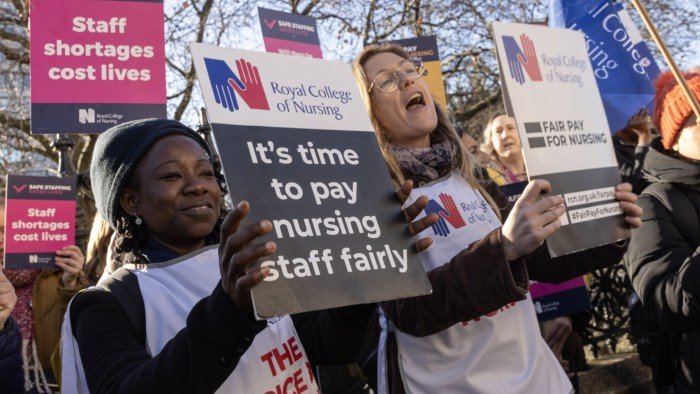Unlock the Editor’s Digest for free
Roula Khalaf, Editor of the FT, selects her favourite stories in this weekly newsletter.
The UK government is braced for the prospect of further public sector strike action, with nurses in England expected to reject a 3.6 per cent pay uplift.
Results of a ballot of staff by the Royal College of Nursing will be announced at the end of the week, and union officials confirmed it would show the sector largely rejected the offer.
Ministers said in May that most NHS workers would receive a 3.6 per cent pay rise, in line with recommendations made by the independent public sector pay review bodies.
Resident doctors, formerly known as junior doctors, were awarded an average pay rise of 5.4 per cent.
Earlier this year, Nicola Ranger, head of the RCN, described the decision to award doctors higher increases in pay than nursing staff as “grotesque” and warned that the sector could be forced to take further strike action.
The threat of more strikes, which could be called by nurses this year, comes as resident doctors stage a five-day walkout in their call for a 29 per cent pay rise.
NHS and ambulance staff represented by the GMB union also voted last week to reject the pay award offered for 2025-26 to health workers in England. The union has since written to the health secretary Wes Streeting calling for an urgent meeting to discuss pay and other concerns.
Ministers and health leaders say that the NHS in England cannot afford more industrial action. They warn that strikes would put at risk their target by the end of this parliament to ensure that 92 per cent of NHS patients wait no more than 18 weeks after referral to begin non-urgent hospital treatment.
A wave of strikes by doctors, nurses, ambulance crews and other NHS workers in 2023 and 2024 forced hospitals to cancel more than 1mn appointments and operations, with NHS trusts estimating the cost of the disruption at up to £3bn.
The industrial unrest was one factor delaying the NHS’s recovery from the pandemic, which hit productivity hard, with the service receiving more funding and staff without delivering an equivalent boost in the levels of care.
Data published this week by the Office for National Statistics suggests healthcare productivity may now be improving, but that it remains 8.8 per cent below its pre-pandemic peak.
The RCN said: “As the largest part of the NHS workforce, nursing staff do not feel valued and the government must urgently begin to turn that around.”
The Department of Health and Social Care said that the government could not move further on headline pay “but will work with the RCN to improve their major concerns, including pay structure reform, concerns on career progression and wider working conditions”.
